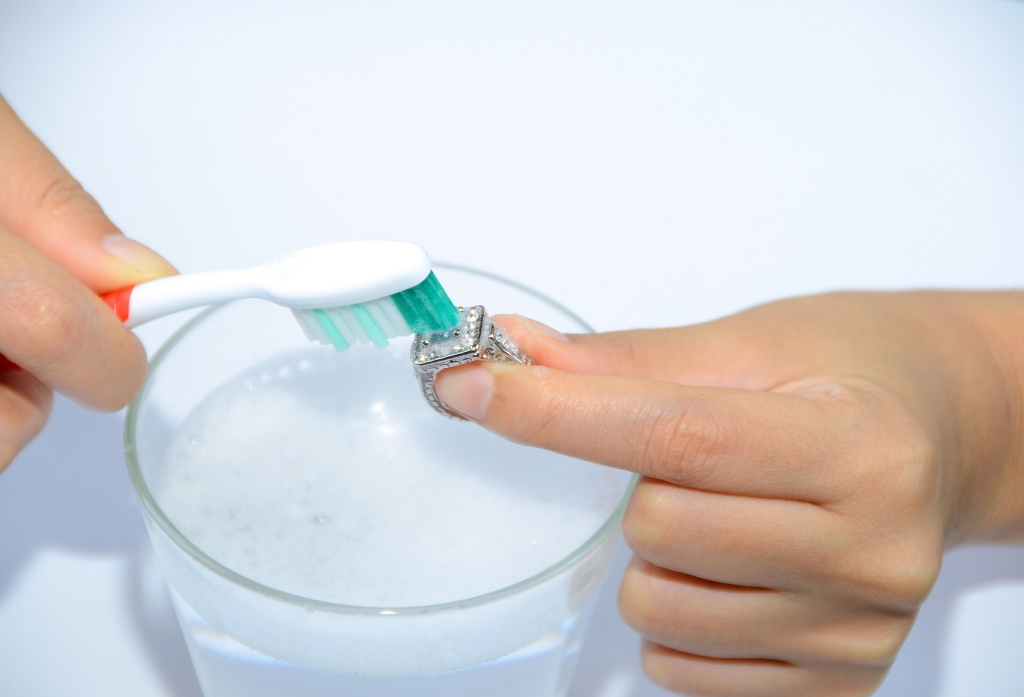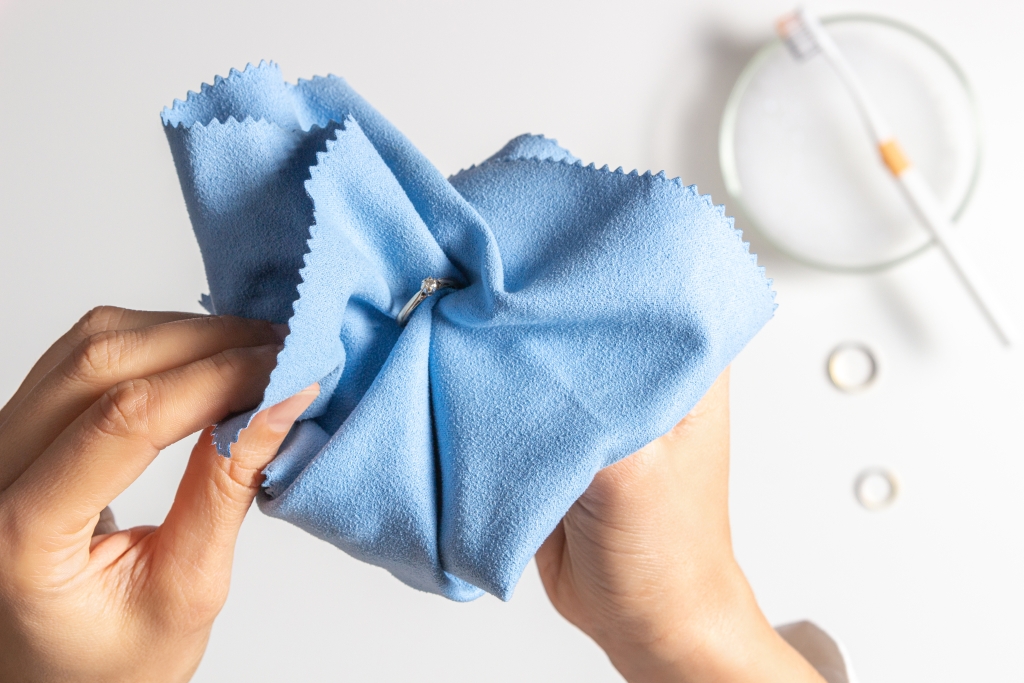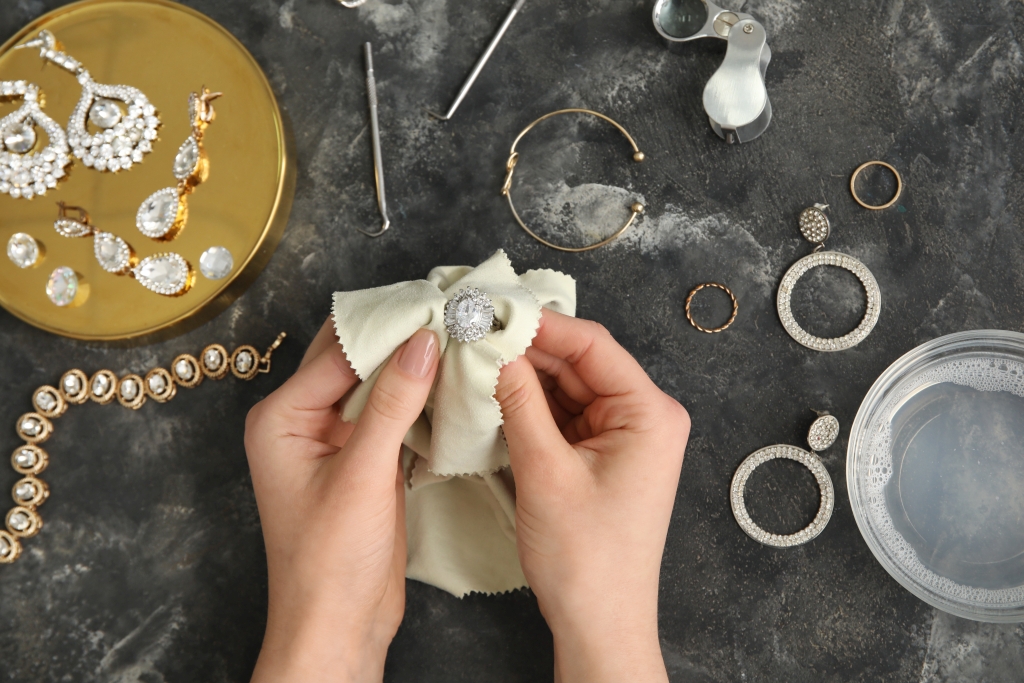
How To Clean Your Diamond Rings
Because we wear our engagement rings and wedding bands every day, they get dirty faster than other jewelry. Even if we’re careful with our rings, they are constantly exposed to the elements, and eventually, that takes a toll. Lotions, hair and makeup products, dirt and debris all build up to make rings look dull and grimy. If your diamond ring is looking a little worse for wear lately, here’s how to clean it.- Keep it simple! The best way to clean your diamond ring is with a solution of soap and water. Fill a bowl with warm water and add in a few drops of a gentle soap, such as dishwashing soap.
- Soak your ring in the soap and water solution for at least ten minutes. If your ring is particularly dirty, you may want to soak it for longer. A good rule of thumb is to check back on your ring every 10-15 minutes. If it looks better, you can remove it from the solution and prepare for the next step.

- Use a gentle brush, like a soft-bristled toothbrush, to scrub away any residue on your ring. You can scrub both the metal and the diamond(s). A travel sized toothbrush may be best, as its small size gives you more control.
- Give the ring a careful rinse under warm water. Dry it with a microfiber towel, or leave it out to air dry.
- If you have a jewelry polishing cloth, feel free to use it!
How To Clean Gold Jewelry
Cleaning plain gold jewelry is quite easy. Regardless of whether it is white gold, yellow gold or rose gold, you can clean it with a simple soak. Follow the same steps as you would to clean diamond jewelry. Use a mix of warm water and gentle soap, allow it to sit in the solution for a little while, scrub it with a gentle brush, rinse it off, and pat it dry! You can also use a home ultrasonic cleaner, if you have one.If your gold jewelry has other elements, like enamel or gems, the cleaning process becomes just a bit more complicated. Softer gems like opals and pearls are best cleaned by a professional jeweler, since they are quite easy to damage.
It’s okay to use soap and water on enamel and harder gems, but ensure that the water is NOT too hot and the soap is not too harsh. Gems and enamel can easily be damaged by strong chemicals or very hot water. Do not use a home ultrasonic cleaner for jewelry that contain gems or enamel.

How To Clean Pearl Jewelry
Because pearls are very soft gems, it’s a good idea to get them cleaned professionally. However, if you need to do a quick touch-up at home, here is how to do it safely.- Carefully inspect the jewelry for signs of wear. Pearl strands are held together by thin threads that are prone to breakage. They need to be restrung every few years. If your pearl strand hasn’t been restrung in awhile, take it in for a restringing and professional cleaning. Otherwise, your necklace may fall apart during cleaning.
- Mix a solution of lukewarm water and dish soap. Water that is too cold or too hot can damage the surface of your pearls.
- Do NOT leave your pearls to soak. Water can weaken the strings of your pearl strands. Instead, dip a gentle cloth into the water and gently wipe down the pearls. Pearls can scratch easily, so be sure the cloth is very soft.
- Place the pearls on a dry cloth and let them air dry.
How To Clean Tarnished Silver
Silver can tarnish over time as it comes into contact with common gases and chemicals. Humidity, chlorine, acids and sulfuric compounds–such as those found in shampoos, perfumes, and certain foods–can all tarnish your silver jewelry. As it reacts to these gases and chemicals it discolors, then forms a surface layer of unsightly tarnish. Luckily, it’s possible to fix it! There are a few household items that can work wonders on tarnished silver jewelry.
Water and Baking Soda: In a small bowl, combine ½ a box of baking soda with water. Mix them together to make a paste. Then, dip a soft cloth into the paste and rub it onto your tarnished silver items. Allow the paste to sit for at least 30 seconds. You can wait up to 10 minutes for heavily tarnished silver. Once the silver has had ample time to sit in the paste, rinse it thoroughly with cool water. Be sure to remove the paste from any nooks and crannies in your jewelry. After rinsing, dry the silver with a gentle cloth..
What NOT To Use On Your Jewelry
Certain items should never be used on your jewelry, as they can cause serious damage. Keep the following household products away from your jewelry:- Bleach: Bleach is an all-purpose cleaner for many household messes. However, it is far too harsh to be used on jewelry. For the same reason, don’t use chlorine or acetone on your jewelry, either.
- Toothpaste: While toothbrushes are good tools to use on your jewelry, toothpaste is not. Toothpaste is an abrasive, with tiny scrubbing particles that help clear plaque and bacteria from your teeth. But the particle that are so helpful for your teeth can easily scratch the surfaces of gems and even precious metals. Toothpaste can also corrode metals.
- Alcohol: It may be a household item, and it may be safe for us to drink, but that doesn’t mean it’s safe for your jewelry. Though it’s not a chemical, alcohol is still extremely harsh. It can dry out and strip away at your jewelry, causing cacking and other damage.
- Acids: Acidic substances like lemon juice and vinegar can eat away at your jewelry. Steer clear of any home cleaning recipes that suggest using these or other acidic products.
- Boiling Water: Many gems can crack if exposed to high heat, particularly emeralds and opals. Very hot water can also weaken metals and even potentially misshape your jewelry.
When To Get A Professional Jewelry Cleaning
If your jewelry is damaged, or if it has been a while since you had it checked for signs of damage, definitely bring it into a professional jeweler before trying anything at home. Trying to clean damaged jewelry will only worsen the damage. Get it repaired first. The jeweler who does your repairs will most likely give it a professional cleaning before returning it to you.Opt for a professional cleaning for soft or fragile stones, jewelry with thin pieces of metal (such as filigree designs), or any vintage pieces that need special care. If you aren’t sure what your jewelry is made of, take it to a pro. Otherwise, you may accidentally harm the piece by using a cleaning technique that is dangerous to any of its components.

In general, if you have any pieces of great monetary or sentimental value, you can reduce the risk of accidental damage by leaving them in the hands of a professional.
Home cleanings are great for routine maintenance of everyday jewelry. However, every 6-12 months, it’s still a good idea to have your jewelry looked at by your local jeweler. This is especially important for the pieces you wear every day, such as engagement rings and wedding bands.
How To Store Your Jewelry Safely
To avoid dirtying your jewelry in the first place, it’s important to store it safely. Storing your jewelry correctly can prevent scratching, tarnishing, dirt buildup and other common issues.The easiest way to store your jewelry safely is with a jewelry box. Jewelry boxes are designed with soft fabrics to keep your pieces from scratching and special compartments to keep them from bumping into each other. Lids keep jewelry safe from dust, humidity, and other potential hazards.
If you want to go even further, you can invest in small Ziploc bags for individual pieces. This is commonly done with silver to give it an extra layer of protection from humidity and natural gases that can tarnish it.


